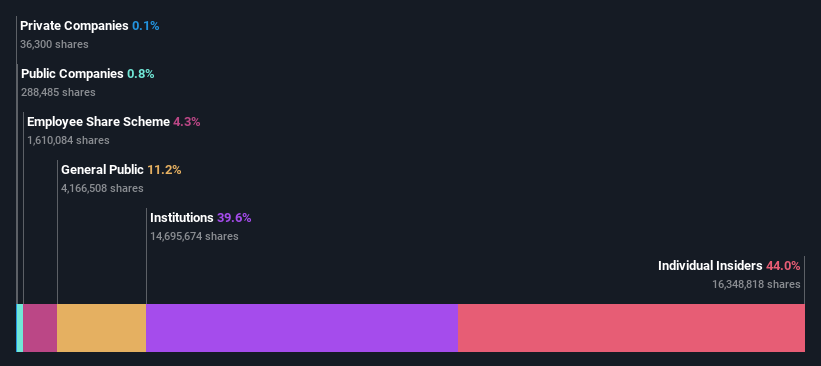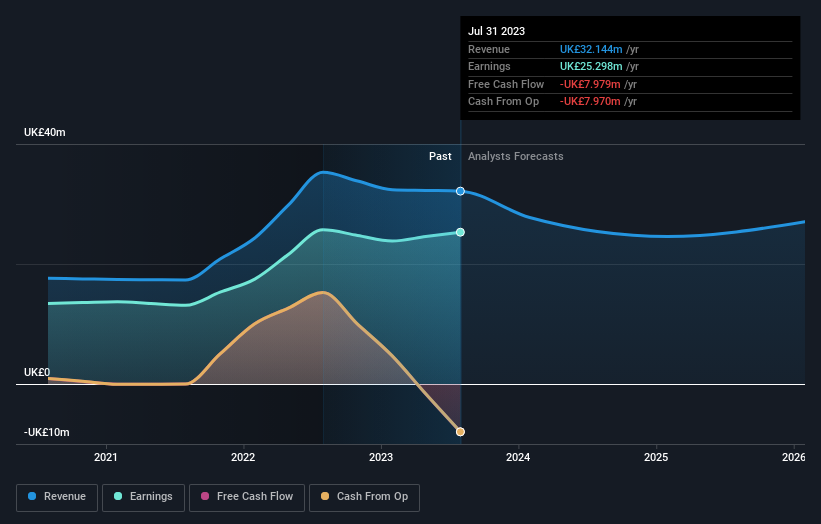Insiders hold 44% of B.P. Marsh & Partners PLC (LON:BPM), and they've been buying recently
Key Insights
Insiders appear to have a vested interest in B.P. Marsh & Partners' growth, as seen by their sizeable ownership
The top 2 shareholders own 58% of the company
To get a sense of who is truly in control of B.P. Marsh & Partners PLC (LON:BPM), it is important to understand the ownership structure of the business. The group holding the most number of shares in the company, around 44% to be precise, is individual insiders. In other words, the group stands to gain the most (or lose the most) from their investment into the company.
A quick look at our data suggests that insiders have been buying shares in the company recently. This could be interpreted as insiders anticipating a rise in stock prices in the near future.
Let's take a closer look to see what the different types of shareholders can tell us about B.P. Marsh & Partners.
See our latest analysis for B.P. Marsh & Partners
What Does The Institutional Ownership Tell Us About B.P. Marsh & Partners?
Institutional investors commonly compare their own returns to the returns of a commonly followed index. So they generally do consider buying larger companies that are included in the relevant benchmark index.
As you can see, institutional investors have a fair amount of stake in B.P. Marsh & Partners. This suggests some credibility amongst professional investors. But we can't rely on that fact alone since institutions make bad investments sometimes, just like everyone does. It is not uncommon to see a big share price drop if two large institutional investors try to sell out of a stock at the same time. So it is worth checking the past earnings trajectory of B.P. Marsh & Partners, (below). Of course, keep in mind that there are other factors to consider, too.
We note that hedge funds don't have a meaningful investment in B.P. Marsh & Partners. From our data, we infer that the largest shareholder is Brian Marsh (who also holds the title of Top Key Executive) with 38% of shares outstanding. Its usually considered a good sign when insiders own a significant number of shares in the company, and in this case, we're glad to see a company insider play the role of a key stakeholder. With 20% and 5.0% of the shares outstanding respectively, PSC Insurance Group Limited, Asset Management Arm and Martin Macleish are the second and third largest shareholders.
To make our study more interesting, we found that the top 2 shareholders have a majority ownership in the company, meaning that they are powerful enough to influence the decisions of the company.
While it makes sense to study institutional ownership data for a company, it also makes sense to study analyst sentiments to know which way the wind is blowing. There is a little analyst coverage of the stock, but not much. So there is room for it to gain more coverage.
Insider Ownership Of B.P. Marsh & Partners
The definition of company insiders can be subjective and does vary between jurisdictions. Our data reflects individual insiders, capturing board members at the very least. The company management answer to the board and the latter should represent the interests of shareholders. Notably, sometimes top-level managers are on the board themselves.
Most consider insider ownership a positive because it can indicate the board is well aligned with other shareholders. However, on some occasions too much power is concentrated within this group.
Our information suggests that insiders maintain a significant holding in B.P. Marsh & Partners PLC. Insiders have a UK£73m stake in this UK£166m business. It is great to see insiders so invested in the business. It might be worth checking if those insiders have been buying recently.
General Public Ownership
The general public-- including retail investors -- own 11% stake in the company, and hence can't easily be ignored. This size of ownership, while considerable, may not be enough to change company policy if the decision is not in sync with other large shareholders.
Next Steps:
While it is well worth considering the different groups that own a company, there are other factors that are even more important. Consider risks, for instance. Every company has them, and we've spotted 1 warning sign for B.P. Marsh & Partners you should know about.
Ultimately the future is most important. You can access this free report on analyst forecasts for the company.
NB: Figures in this article are calculated using data from the last twelve months, which refer to the 12-month period ending on the last date of the month the financial statement is dated. This may not be consistent with full year annual report figures.
Have feedback on this article? Concerned about the content? Get in touch with us directly. Alternatively, email editorial-team (at) simplywallst.com.
This article by Simply Wall St is general in nature. We provide commentary based on historical data and analyst forecasts only using an unbiased methodology and our articles are not intended to be financial advice. It does not constitute a recommendation to buy or sell any stock, and does not take account of your objectives, or your financial situation. We aim to bring you long-term focused analysis driven by fundamental data. Note that our analysis may not factor in the latest price-sensitive company announcements or qualitative material. Simply Wall St has no position in any stocks mentioned.


